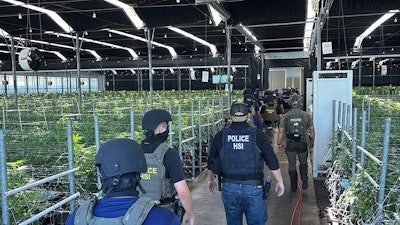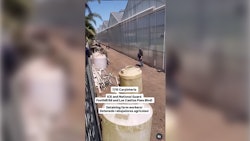
Federal agents are now investigating potential child labor and human trafficking violations in connection with 14 migrant children they took into custody during raids a two cannabis cultivation sites on July 10 in southern California.
The U.S. Immigration and Customs Enforcement (ICE) and U.S. Customs and Border Protection (CBP) agents executed search warrant operations at state-licensed cannabis cultivator Glass House Farms’ grow sites in Carpinteria (Santa Barbara County) and Camarillo (Ventura County).
While the federal officials initially reported July 11 that they “rescued” at least 10 migrant children—posting a public photo of five masked agents standing behind the teenagers with blurred-out faces—the Department of Homeland Security (DHS) provided an update on July 13 that the raids resulted in 14 migrant children in custody and that federal agents arrested 361 illegal aliens from the sites, including four individuals convicted of violent crimes, according to the DHS.
“This is quickly becoming one of the largest operations since President Trump took office,” DHS Secretary Kristi Noem said.
Glass House Farms, one of the largest state-sanctioned cannabis operators in the U.S., with up to 6 million square feet of cultivation space and 10 dispensaries, posted on X on July 10 that the company fully complied with the search warrants and on July 11 that it never “knowingly violated applicable hiring practices and does not and has never employed minors.”
In addition to the arrests, 57-year-old Jaime Alanis, who fell about 30 feet from the roof of one of the company’s greenhouses, broke his neck and died on July 12 at the Ventura County Medical Center after spending two days on life support, The Associated Press and other mainstream media outlets reported.
Editor’s note: The United Farm Workers prematurely reported Alanis’ death on July 11, and many media organizations had to correct their reporting.
Although the AP reported that Alanis was “possibly fleeing federal agents” before he fell, DHS Assistant Secretary Tricia McLaughlin disputed that narrative. “Although he was not being pursued by law enforcement, this individual climbed up to the roof of a greenhouse and fell 30 feet,” she said in a public statement.
Alanis is the first person to die as a result of one of the Trump administration’s series of immigration enforcement operations, according to the AP.
California Attorney General Rob Bonta condemned the ongoing operations in a virtual town hall meeting on July 12.
“The terror and the chaos we witnessed at those sites [are] deeply troubling, and sadly, that’s part of the Trump administration’s strategy in Ventura County, Los Angeles and throughout our state,” Bonda said. “The administration is using federal immigration agents as a tool to instill fear and to instill division. Agents are wearing masks. They’re driving unmarked vehicles. They’re dressing in plain clothes and refusing to identify themselves when asked, making it difficult to distinguish them from criminals or from anyone else.”
The state attorney general also accused President Donald Trump’s federal agents of often interrogating individuals based on racial profiling rather than on evidence of wrongdoing.
The chaotic scenes on July 10 in Carpinteria and Camarillo unfolded as more than 500 protesters confronted federal agents during the operations, in some cases sparking violent exchanges, including four U.S. citizens who were criminally processed for assaulting or resisting officers, according to the DHS. The Federal Bureau of Investigation (FBI) offered a $50,000 reward on July 11 for information leading to the arrest of another individual, whom DHS officials said fired a gun at law enforcement officials.
Meanwhile, other citizens at the sites posted videos on social media, claiming that federal agents escalated the clash when they fired rubber bullets and tear gas at peaceful protesters and bystanders.
Among the 361 illegal aliens arrested at Glass House’s grow sites, the DHS specifically provided details about four individuals whom department officials said have troubling criminal histories.
Roman Izquierdo—an illegal alien from Mexico—was one of the four individuals. He has been convicted of kidnapping, attempted rape and attempted child molestation, according to the DHS. ICE previously deported him in 2006. The other three individuals were convicted of various crimes, ranging from rape to DUIs, a hit-and-run with property damage, and burglaries, according to the DHS.
Although the investigation remains ongoing, DHS officials said these “violent and dangerous criminal illegal aliens” were working at the cannabis sites.
“He was sentenced to seven years for KIDNAPPING & attempted RAPE,” McLaughlin said of Izquierdo in a July 12 post on X. “He also had a prior conviction for attempted child molestation. He was working at the same farm as the … unaccompanied children. This is depraved.”
The large-scale operation further sparked political division between California’s elected officials and those in Trump’s executive branch: Gov. Gavin Newsom accused the president of using tear gas on children and separating families, while the DHS fired back on social media, accusing Newsom of turning a blind eye to child labor laws.
Federal child labor laws allow minors as young as 14 to gain agricultural employment outside of school hours, or as young as 12 with written parental consent. The minimum age for employment during school hours is 16. “Fair Labor Standards Act (FLSA) applies to migrants and local residents regardless of farm size or number of man-days of farm labor used on that farm,” according to the U.S. Department of Labor (DOL).
In California, minors as young as 12 can be employed outside of school hours, per state law. The minimum age for employment during school hours is 18, or “16 if not required to attend school,” according to the DOL.
However, cannabis employment laws differ. In California, the minimum age “to work within or on a licensed premises or to handle cannabis or cannabis products” is 21, according to the state’s Department of Cannabis Control (DCC).
For some, the presence of underage persons at a cannabis facility is a sticking point; however, the public does not know the full details of the 14 migrant children taken into federal custody.
Elliot Lewis, the CEO of Catalyst, a licensed cannabis company in California, questioned how “unaccompanied minors,” as federal authorities reported, ended up in Carpinteria and Camarillo.
“Look, these are allegations. Let's let all the facts bear out. There's eight unaccompanied minors, right? ... Where are their parents? What are they being paid? What are they being used for?” Lewis said on July 12 in a video on social media. “Again, let me say this: We’re against the raids of farms here in California, to be clear. But maybe just step back for a minute and say … ‘Maybe that’s worthy of investigation.’”
Furthermore, Lewis said the presence of hundreds of undocumented workers, if true, doesn’t have the appearance of an unintentional practice.
Glass House officials released a statement saying they do not expect the July 10 events to affect their operations moving forward.
While disciplinary actions related to state-licensed cannabis companies usually fall under state regulatory bodies, such as the DCC, the federal implications of the July 10 raids have placed a national spotlight on the industry at large.
Cannabis Business Times Editorial Director Noelle Skodzinski contributed to this report.

























